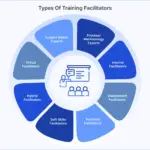In today’s fast-evolving educational landscape, the role of a Skills Development Facilitator (SDF) has gained prominence as organizations and educational nstitutions strive to bridge the gap between curriculum and practical, industry-aligned skills. As modern curricula increasingly emphasize applied learning, adaptability, and continuous skill development, SDFs are essential in designing programs that meet both educational standards and real-world demands.
Who is a Skills Development Facilitator?
A Skills Development Facilitator is a specialist responsible for designing, implementing, and monitoring skills development programs within educational institutions, businesses, and training organizations. They collaborate with stakeholders—curriculum developers, industry experts, and educators—to ensure that training programs are relevant, practical, and beneficial for learners and organizations. SDFs play a pivotal role in aligning curriculum outcomes with industry needs, ensuring learners acquire competencies supporting their future careers.
Key Responsibilities of a Skills Development Facilitator in Curriculum Development
- Needs Assessment and Analysis
One of the primary responsibilities of an SDF is to conduct comprehensive needs assessments to identify skill gaps within a given field. By analyzing current industry trends and consulting with employers, SDFs determine which competencies are essential for the workforce. This information helps curriculum developers create content that is both forward-looking and practical, providing learners with valuable skills aligned with market demands. - Curriculum Alignment with Industry Standards
SDFs ensure that curricula remain relevant by aligning them with industry standards, certifications, and evolving technologies. By integrating these elements into training programs, SDFs help institutions produce graduates who meet the competency requirements of potential employers. This alignment not only enhances employability but also bridges the divide between academic learning and practical application. - Stakeholder Collaboration
Effective curriculum development requires collaboration between educators, industry leaders, and policymakers. SDFs facilitate these connections, gathering input from each group to inform curriculum design. This collaborative approach ensures that programs address the latest industry requirements while maintaining educational integrity and supporting the institution’s goals. - Program Development and Implementation Support
Beyond curriculum design, SDFs also contribute to the practical implementation of skills-based programs. They work with instructors to develop teaching materials, organize workshops, and ensure educators are trained to deliver industry-aligned content. SDFs may also provide input on instructional methodologies that best support skills acquisition, such as hands-on training, simulations, or internships. - Monitoring and Evaluation of Learning Outcomes
An essential aspect of the SDF role is the continuous monitoring and evaluation of curriculum effectiveness. Through assessments, feedback loops, and regular analysis of learning outcomes, SDFs identify areas for improvement and make recommendations for curriculum adjustments. This ongoing evaluation ensures that programs remain effective and responsive to changing industry needs.
The Impact of Skills Development Facilitators on Modern Education
The influence of Skills Development Facilitators extends beyond curriculum development; they play a crucial role in shaping a workforce that is adaptable, skilled, and prepared for modern challenges. By focusing on competency-based learning and aligning educational programs with the real world, SDFs reduce the skills gap, foster innovation, and enhance lifelong learning opportunities.
As education evolves to meet the demands of a technology-driven world, the need for SDFs will only grow. Their expertise in merging academic goals with practical skills makes them invaluable in creating a dynamic, effective curriculum that prepares learners for success.
To know more: https://academian.com/services/
